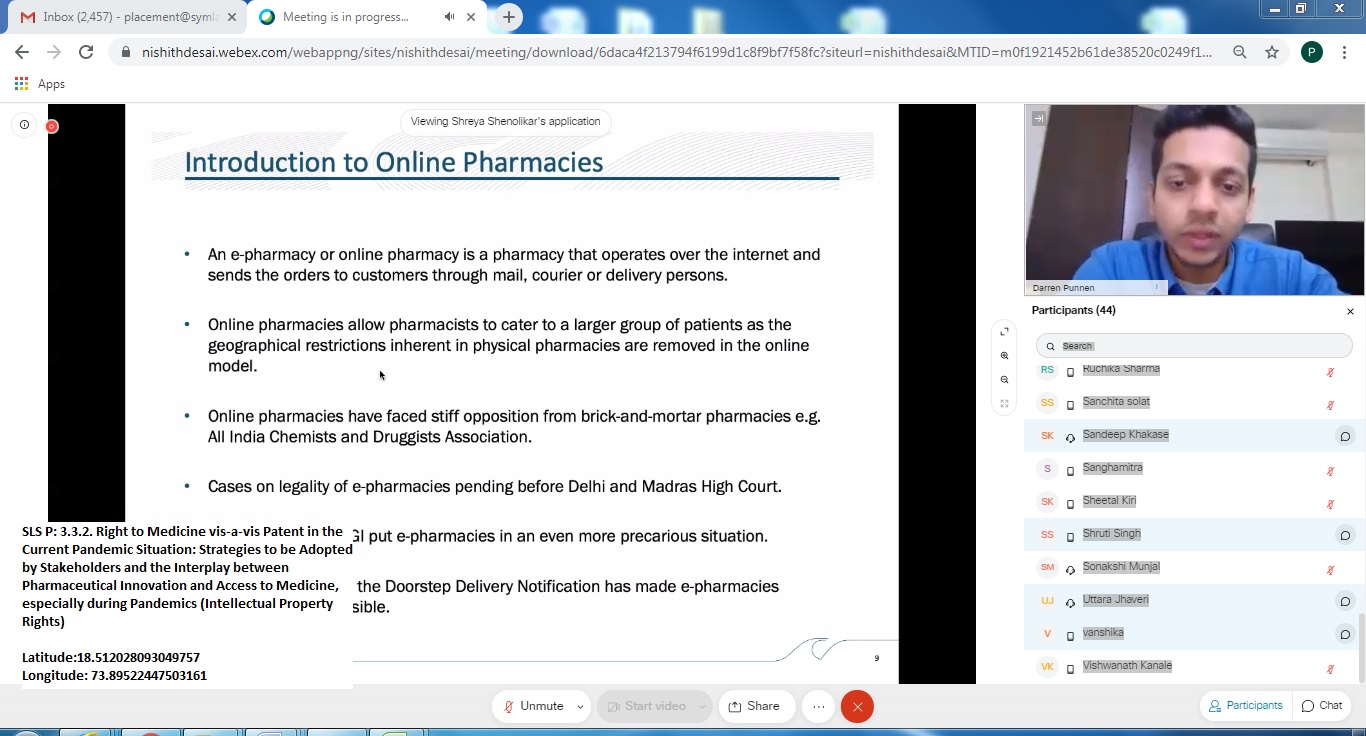.jpg)
Symbiosis Law School, Pune’s Placement Cell organised a guest session cum workshop on “ Right to Medicine vis-a-vis Patent in the Current Pandemic Situation: Strategies to be Adopted by Stakeholders and the Interplay between Pharmaceutical Innovation and Access to Medicine, especially during Pandemics ” by Darren Punnen (Member, Pharma & Life Sciences Practice) Leader, Pharma & Life Sciences Practice at Nishith Desai Associates on 24th August, 2020; 12:00pm – 1:00pm. Around 71 students from 2016-21 B.A/B.B.A L.L.B. (Hons.), 2018-21 of L.L.B. and 2020-21 of LL.M, 2017-22 of 5 Year B.A/B.B.A L.L.B. (Hons.) & 2019-22 of 3 Year L.L.B. attended the event.
The session focused on the earliest articulation of WHO's mandate to work on the interface between access to medical products, research and development in rare and tropical diseases, and trade can be found in a World Health Assembly (WHA) resolution on the Revised Drug Strategy from 1996, which asked the WHO Director-General (DG) to support Member States in their efforts to improve access to essential drugs, encourage the promotion of R&D of drugs for rare and tropical diseases, and report on the impasse. This mandate has been reaffirmed time and time again in successive assembly resolutions. It has since been expanded to include providing technical and policy help to Member States on the formulation of cohesive trade and health policies, as well as the implementation of TRIPS flexibilities in partnership with other relevant international organisations, where requested.
The HIV/AIDS pandemic of the 1990s, as well as the current search for a viable treatment and vaccination for COVID-19, emphasise the contradictions between intellectual property rights and public health concerns. There is evidence that the lessons of the HIV/AIDS pandemic have been learned. Some of these lessons include pharmaceutical corporations' willingness to enter into voluntary licencing arrangements with manufacturing companies in developing nations in order to service less developed markets, such as Gilead Sciences. The rapidity with which nations like Canada, Germany, Chile, and Ecuador modified their patent laws to ban market exclusivity and allow for compulsory licencing of COVID-19 therapeutic items if necessary is an example of how TRIPS flexibilities can be used to solve health concerns.
The African Region's low levels of patenting activity highlight the need to establish and expand health innovation systems in the region. This can be accomplished by enacting policies that support health research systems and establishing a local incentive structure that directs research toward local health problems. Establishing local scientific and biomedical research capacities, as well as local manufacturing capabilities, are other facets of developing health innovation systems. It allows the WHO Regional Office for Africa to collaborate closely with ARIPO and OAPI to develop and promote a Regional IP framework that is responsive to the Region's public health challenges, as well as to assist countries in revising their national IP laws, taking into account available flexibilities, including LDC transition waivers and those not commonly used in the Region, such as research exceptions, regulatory review exceptions, and patent term extensions.
The event came to a close with a vote of gratitude from the Symbiosis Law School's placement cell in Pune.

Title: Right to Medicine vis-a-vis Patent in the Current Pandemic Situation: Strategies to be Adopted by Stakeholders and the Interplay between Pharmaceutical Innovation and Access to Medicine, especially during Pandemics
Details of Resource Person:
Resource Person: Darren Punnen (Member, Pharma & Life Sciences Practice) Leader, Pharma & Life Sciences Practice at Nishith Desai Associates